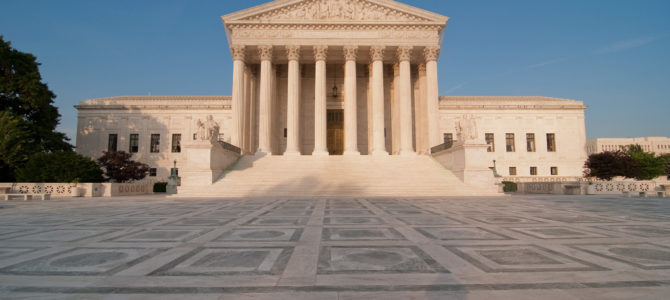
A new Supreme Court brings new hope to reeling in unchecked federal power. For the last few decades, the Supreme Court has allowed Congress to delegate unchecked power to unelected agency officials, who are mainly part of the executive branch. The executive branch has thus legislated through unelected officials and latched onto powers not granted to them via the Constitution.
The most recent example is President Joe Biden’s mandate that large employers require their workers to be vaccinated or test for the virus weekly.
The executive branch plays a far more significant role in our everyday lives than the Founding Fathers intended. Article 1, Section 1 of the Constitution prescribes that all legislative power lies with Congress. Why then, has the executive played such a significant role in creating law in recent history?
For example, Biden announced he will look into having the Department of Education, an executive agency, mandate masks for all school children, despite kids facing almost zero risk from Covid-19.
The Centers for Disease Control and Prevention, an agency to prevent and control disease, injury, and disability, inserted itself into the real estate market and enacted an eviction memorandum, preventing landlords from evicting tenants because of Covid-19.
The Federal Aviation Administration was created to enforce regulations dealing with manufacturing, operating, and maintaining aircraft. This has translated into the FAA enforcing masks for all airplane passengers.
We’ve even seen the Securities Exchange Commission go after brokers for providing certain cryptocurrencies, based on their definition of what constitutes a security.
The Supreme Court Gave Agencies More Discretion
In early cases, such as the 1935 case Panama Refining Co. v. Ryan, the Supreme Court held that Congress could not delegate power without providing a clear standard for how to exercise that power.
By 1989, this so-called non-delegation doctrine began to unravel. In Mistretta v. United States, the Supreme Court held that where Congress gave a few guidelines to follow when rulemaking, this acts as a sufficient guiding principle. In 2019, the Court ruled in Gundy v. United States that as long as Congress tells an agency to act “reasonably” or “feasibly,” that is enough guidance and the agency can flesh out the details of the law.
Today, when Congress leaves a gap in a statute and essentially gives an agency the power to act as reasonable within that gap, so long as the agency acts reasonably, courts will afford it the discretion to decide how to act. This kind of unchecked power is certainly not what the Framers had in mind.
3 Constitutional Ways Congress May Delegate Power
Fortunately, the future looks promising for changing course on this dangerous precedent, especially with Justices Brett Kavanaugh and Amy Coney Barrett having joined the court.
Although the Gundy opinion ultimately was not successful in reeling in the federal government, Justice Neil Gorsuch’s dissent provides valuable insight for the future. Gorsuch attacked the statute, arguing that it “endow[s] the nation’s chief prosecutor with the power to write his own criminal code” and that it gives him “free rein.” This is because, although the statute says to act as “feasible,” nowhere in the statute does it actually define what feasible means.
Gorsuch laid out the only three constitutional ways Congress may delegate power: First, when Congress makes a policy decision regulating private conduct and leaves it up to another branch to “fill up the details.” Second, when Congress creates a rule but leaves it up to the executive to do the fact-finding. Third, when Congress’ legislative authority overlaps with the powers of another branch, Congress may give that other branch broad authority over what it is already entitled to do, such as power over foreign affairs.
Although Justice Samuel Alito did not join in this dissent, it was not because he disagreed with Gorsuch. Instead, Alito said he was not willing to reconsider the approach for a single case without analyzing the decade’s worth of Supreme Court precedent.
The Court Could Check Agencies’ Power
Moving forward, it seems that Justices Gorsuch, Clarence Thomas, John Roberts, and Samuel Alito will all be on board with checking agencies’ power. This means one more vote is required. Barrett is an originalist and a former Federalist Society member who could fall in line with the current trend of the group. Kavanaugh questioned the constitutionality of broad delegation in past writings and indicated that it was time to review this longstanding doctrine.
Federal agencies’ current unchecked power goes against the core of our separation of powers doctrine. It is improper for one to hold both executive and legislative powers. As James Madison said, “[t]here can be no liberty where the legislative and executive powers are united in the same person, or body of magistrates.”
Finally, one sign it’s time for this change is that far-left publications are in a panic that the Supreme Court might revisit this issue, which would make it difficult for them to enact environmental regulations through the Environmental Protection Agency. We must reverse course on the unconstitutional path of giving unchecked legislative powers to unelected bureaucrats.









